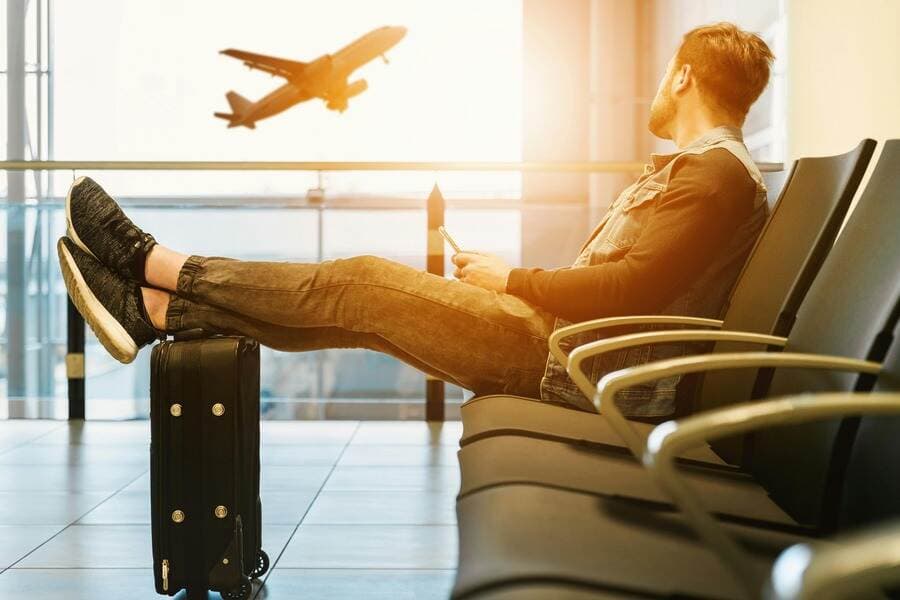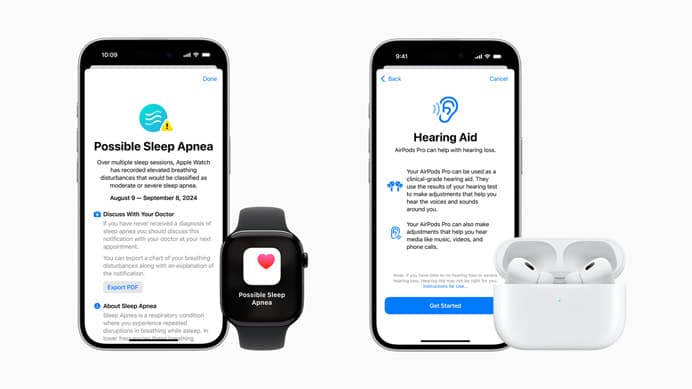December 26, 2024
Traveling with Tinnitus
Article Navigation: Quick Access to Sections
Traveling offers exciting opportunities for exploration and relaxation, but for individuals with tinnitus, it can also bring unique challenges. From protecting your ears during flights and navigating pressure changes to managing noise in unfamiliar environments, this guide provides actionable tinnitus travel tips to ensure a comfortable and enjoyable journey.
Understanding Tinnitus and Its Travel Challenges
Tinnitus affects millions of people worldwide and its impact can range from a mild background inconvenience to a significant hindrance on daily life. When traveling with tinnitus, certain aspects of the journey can amplify these challenges:
- Noise Exposure: Airports, train stations, bustling city streets, and even some tourist attractions can be overwhelmingly loud environments, potentially aggravating tinnitus.
- Pressure Changes: Airplane cabins during ascent and descent, as well as travel to high-altitude destinations, involve atmospheric pressure shifts that can exacerbate tinnitus for some individuals.
- Sleep Disruptions: Changing time zones (jet lag) and unfamiliar sleeping environments can disturb crucial sleep patterns, a key factor in tinnitus perception and management.
- Stress and Anxiety: The inherent stresses of travel—planning, navigating, and adapting to new situations—can heighten tinnitus awareness and perceived severity.
While these challenges associated with managing tinnitus on vacation or during travel may seem daunting, they are often manageable with the right preparation and strategies.

Preparing for Your Trip: Essential Tips for Tinnitus Management
Proactive planning is key to a smoother travel experience when you have tinnitus.
1. Consult with a Healthcare Professional
Before embarking on your travels, especially if you have concerns, schedule a consultation with your audiologist or ENT specialist. They can:
- Assess your current hearing status and tinnitus condition.
- Recommend appropriate ear protection devices, such as custom-molded earplugs or specific types of noise-canceling headphones.
- Provide personalized advice on managing pressure changes during flights if you're susceptible to ear issues.
2. Plan for Quiet Time and Rest
Incorporate sufficient downtime into your itinerary to rest and recover from sensory stimulation. Overstimulating environments can worsen tinnitus for some. Balance exciting sightseeing with moments of quiet relaxation to help manage your symptoms.
3. Pack a Tinnitus Travel Kit
Prepare a dedicated travel kit with essentials to help you manage your tinnitus effectively while away from home:
- Earplugs: High-quality earplugs for noise reduction during flights, in noisy accommodations, or in loud public spaces.
- Noise-Canceling Headphones: To block out unwanted ambient sounds and create a more controlled auditory environment.
- White Noise Generator or App: Portable devices or smartphone apps from our Zen library can help mask tinnitus in quiet hotel rooms or other environments where silence might make tinnitus more noticeable.
- Tinnitus Relief Medication or Supplements: If prescribed or recommended by your healthcare provider for managing tinnitus or related symptoms like anxiety or sleep issues.
- Eye Mask and Neck Pillow: To promote restful sleep during long journeys, as good sleep is crucial for tinnitus management.
4. Download Helpful Apps
Several tinnitus management and wellness apps can be invaluable while traveling:
- Sound therapy apps that play white noise, pink noise, or soothing nature sounds.
- Meditation and mindfulness apps to help reduce travel-related stress and promote relaxation.
- Your tinnitus management app, like the Tinnitus Help App, if it offers offline features or downloadable content.
Ear Protection During Flights: A Key Focus for Flying with Tinnitus
Air travel presents specific challenges for those flying with tinnitus, particularly due to changes in air pressure and the constant drone of engine noise. Here's how to protect your ears and minimize discomfort:
1. Manage Pressure Changes Effectively
Rapid changes in cabin pressure during takeoff and landing can affect the Eustachian tubes and potentially exacerbate tinnitus. To mitigate this:
- Use filtered earplugs specifically designed for air travel (e.g., pressure-regulating earplugs). These help equalize pressure changes more gradually and can also reduce noise levels.
- Perform the Valsalva maneuver gently: Close your mouth, pinch your nose, and try to exhale softly as if blowing through your nostrils. ([learn how here - Reputable Medical Source]). Do this periodically during ascent and descent.
- Chew gum, suck on hard candy, yawn, or swallow frequently during ascent and descent to help keep your Eustachian tubes open.
2. Block Out Engine Noise and Ambient Sound
The constant hum of airplane engines can be particularly bothersome for individuals with tinnitus. To combat this:
- Wear high-quality noise-canceling headphones. You can listen to soothing music, podcasts, audiobooks, or white noise through them.
- If possible, try to select seats away from the engines (typically, seats near the front of the cabin or over the wings are quieter).
3. Stay Hydrated During the Flight
Dry cabin air can lead to dehydration, which can contribute to ear discomfort and potentially worsen tinnitus.
- Drink plenty of water throughout the flight. Consider exploring tips on hydration and tinnitus.
- Avoid or limit alcohol and caffeine, as they can be dehydrating and may act as stimulants that can affect tinnitus perception for some.
4. Prioritize Sleep on Long Flights
Fatigue can amplify tinnitus symptoms. Use a comfortable travel pillow, an eye mask, and earplugs (or noise-canceling headphones) to create a restful environment conducive to sleep during long-haul flights.

Adapting to New Environments with Tinnitus
Traveling often means adjusting to unfamiliar surroundings, which can sometimes trigger or worsen tinnitus symptoms. Here’s how to adapt effectively:
1. Control Noise Levels in Your Accommodation
In new environments, you may encounter unexpected noise, such as street traffic, noisy hotel neighbors, or different ambient sounds. To manage this:
- Use a portable white noise machine or app to mask background noise, especially while sleeping.
- When booking accommodations, request a quiet room—ideally one away from elevators, ice machines, bars, or busy streets.
2. Establish a Sense of Routine
Maintaining a consistent daily routine as much as possible can help reduce stress and provide a sense of normalcy, which can be beneficial for tinnitus management. This includes regular meal times, consistent sleep schedules, and incorporating moments for relaxation or mindfulness.
3. Practice Stress Management Techniques
New environments and disrupted schedules can lead to stress, which may worsen tinnitus perception. Incorporate stress-relief techniques into your travel routine:
- Meditation or deep breathing exercises.
- Light physical activity like yoga or walking.
- Listening to calming music or engaging in a relaxing hobby.
4. Monitor Your Diet
While enjoying local cuisine is part of the travel experience, be mindful of foods and drinks that can potentially exacerbate tinnitus for you:
- High-sodium foods, which can affect blood pressure and fluid balance.
- Excessive caffeine or alcohol, which may heighten tinnitus awareness or disrupt sleep.
- Highly sugary snacks or meals, which can cause energy crashes and potentially affect overall well-being and symptom perception.
Staying Relaxed and Focused During Your Journey
Maintaining a calm and centered mindset is crucial when traveling with tinnitus.
1. Embrace Mindfulness and Present Moment Awareness
Mindfulness techniques can be particularly beneficial. Focus on the present moment and immerse yourself in the travel experience rather than fixating on tinnitus sounds. Practices like deep breathing exercises, progressive muscle relaxation, or even a brief session of meditation can help center your thoughts and reduce stress.
2. Manage Expectations and Stay Flexible
Travel may bring unexpected situations, and not everything will always go as planned. Keep a flexible attitude and approach challenges with patience to prevent unnecessary stress. Embrace the idea that travel is about the experience, not perfection, and focus on what you can enjoy rather than potential disruptions.
3. Connect with Support if Needed
If tinnitus starts to feel overwhelming during your trip, talk to someone. This could be a travel companion, a family member back home, or even an online tinnitus support group. Sharing your experience can provide comfort and sometimes helpful tips from others who understand.
4. Create a Personal Sanctuary On-the-Go
Carry small items that help you relax and feel comfortable, creating a sense of a personal sanctuary wherever you are:
- Your trusted noise-canceling headphones.
- A playlist of soothing music or nature sounds from our Zen library.
- A small notebook or journal to jot down thoughts, observations, or moments of gratitude, which can shift focus away from tinnitus.
5. Stay Physically Active
Gentle physical activity, such as stretching, yoga, or walking, can reduce stress and improve circulation, which may help ease tinnitus symptoms. Consider incorporating these into your travel routine.
6. Leverage Technology Wisely
Use technology to your advantage by downloading relaxation, mindfulness, or white noise apps before your trip. Some apps are designed specifically for tinnitus management and include customizable soundscapes.
7. Take Frequent Breaks and Pace Yourself
Traveling can be exhausting, and fatigue can heighten tinnitus awareness. Plan for short breaks throughout your day to rest and recharge. Giving yourself downtime can make a significant difference.
8. Practice Gratitude to Shift Focus
When tinnitus feels overwhelming, practicing gratitude can shift your focus to the positive aspects of your journey. Take a moment each day to reflect on something you’re grateful for.
By incorporating these strategies, you can navigate your travels with greater ease and enjoy the journey, even while managing tinnitus on vacation.
Real-Life Tips from Frequent Travelers with Tinnitus
We’ve gathered advice from individuals who frequently travel with tinnitus and have learned to manage their condition effectively on the go. Their experiences offer practical insights:
“Noise-canceling headphones are a game-changer. I use them not just on planes but also in busy cities and even during long car rides.” – Sarah, 36
“I never leave home without a travel-sized white noise machine or my phone loaded with sound apps. It helps me sleep anywhere, whether it’s a noisy hotel or a rural village.” – Mike, 42
“Planning quiet moments into my day has been essential. I love exploring, but I make sure to take breaks to recharge, often with a calming nature walk if possible.” – Priya, 29
Traveling with Tinnitus: A Global Perspective
Different types of destinations can present unique tinnitus challenges and considerations:
- Urban Destinations: Cities like New York, London, or Tokyo can be loud and overstimulating. Use earplugs in crowded places and noise-canceling headphones during commutes. Plan visits to parks or quieter museums for sensory breaks.
- Mountain Regions / High Altitudes: Altitude changes can cause pressure issues for some. Use pressure-regulating earplugs during ascent/descent if driving or flying into such areas. Stay well-hydrated.
- Tropical Getaways / Humid Climates: Humidity can sometimes affect sinus issues or ear infections for susceptible individuals, which may in turn worsen tinnitus. Stay hydrated, manage allergies if you have them, and ensure ears are dried properly after swimming.
Future Innovations for Traveling with Tinnitus
As technology evolves, managing tinnitus while traveling is likely to become even easier. Innovations aim to make tinnitus management tools more accessible, effective, and personalized. Here are some advancements to look forward to or that are emerging:
- Advanced hearing aids and wearable sound generators with real-time adaptive noise-canceling features. These devices are becoming smarter, integrating AI to adapt to different sound environments seamlessly.
- Smart apps that can track tinnitus patterns in relation to environmental factors and provide personalized advice or automated sound therapy adjustments.
- Improved custom ear protection tailored to individual hearing profiles and tinnitus frequencies, offering better protection without sacrificing sound clarity for desired sounds.
One example of how current technology is already helping tinnitus sufferers is Apple’s AirPods Pro. With features like active noise cancellation, personalized sound amplification (Live Listen), and hearing health tracking tools, they have proven beneficial for managing tinnitus both at home and on the go. Learn more about how these devices can assist tinnitus sufferers in our detailed post: AirPods and Tinnitus: A New Hope. Incorporating such devices into your travel routine can make a significant difference. As these technologies continue to evolve, they promise to enhance the travel experience for tinnitus sufferers.

Conclusion: Traveling with Confidence Despite Tinnitus
Tinnitus doesn’t have to limit your travel experiences or diminish your sense of adventure. With proper preparation, effective ear protection strategies, and mindful techniques for adapting to new environments, you can enjoy fulfilling and comfortable journeys. Whether it’s a short weekend getaway or an extended international trip, these tinnitus travel tips are designed to help you manage your condition and focus on the joy of exploration.
Remember, the key is often balance—embracing the adventure while consistently taking care of your auditory and emotional well-being. Safe travels!